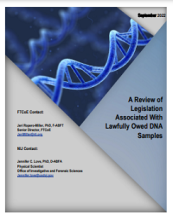Inmates/offenders
Downstream Effects of Frayed Relations: Juror Race, Judgment, and Perceptions of Police
The Impact of Legal-Financial Obligations on Relationships With Family, Friends, and Acquaintances: A Qualitative Study of Community Supervised Men With Sexual and Nonsexual Offense Convictions
The Postconviction Workgroup: Cooperation Between Adversaries in Exoneration Cases
The role of hopelessness and procedural justice on depressogenic outcomes in serious adolescent offenders
Cold Cases and Serial Killers, Part 1
In April 2018, the Golden State Killer, Joseph DeAngelo was arrested. NIJ support helped lead to his arrest, and in the aftermath of the arrest, NIJ Social Science Analyst Eric Martin was among those tasked with finding other cases NIJ helped law enforcement solve. Eric joins the show to talk about some of those cases, and answer some broader questions about serial killers: What is a serial killer? Are they on the rise? How do we know how many serial killers are currently active?
Where is the Evidence? Comparing the Effects of Evidence Strength and Demographic Characteristics on Plea Discounts
Inclusive Research: Engaging People Closest to the Issue Makes for Better Science & Greater Impact; 2023 NIJ Research Conference Plenary
This panel will discuss what inclusive research is, how to conduct it, and what issues and challenges exist about engaging in it. “Inclusive research” has its history as a participatory research method designed to ensure people closest to the issue or problem under study are authentically engaged in the research process rather than simply being “research subjects.” While community-based participatory research has begun to take on greater prominence in the criminal justice realm, such efforts are largely confined to qualitative research inquiries.
See the YouTube Terms of Service and Google Privacy Policy
The price of a sex offense conviction: A comparative analysis of the costs of community supervision
Impact of State Ignition Interlock Laws on Alcohol-Involved Crash Deaths in the United States
Research on Forensic Toxicological Laboratory Testing and Reporting Practices
Enhancing resolution and statistical power by utilizing mass spectrometry for detection of SNPs within the short tandem repeats
A Review of Legislation Associated With Lawfully Owed DNA Samples
The Evolving Character of Public Defense: Comparing Criminal Case Processing Effectiveness and Outcomes Across Holistic Public Defense, Traditional Public Defense, and Privately Retained Counsel
Exposing School Employee Sexual Abuse and Misconduct: Shedding Light on a Sensitive Issue
Contextual Influences on the Sentencing of Individuals Convicted of Sexual Crimes
Tribal Crime, Justice, and Safety, Part 1
Research indicates that Native American persons experience crime victimization at higher rates than non-Native people. Furthermore, the unique position of American Indian and Alaska Native tribes as both sovereign nations and domestic dependents of the U.S. creates jurisdictional complexities in responding to crime, justice, and safety. Senior social and behavioral scientist Christine (Tina) Crossland discusses NIJ’s research on these topics, especially on the prevention of violence towards American Indians and Alaska Natives. Communications Assistant Stacy Lee Reynolds hosts.
Hawaii's Swift and Sure Probation
Deportable Aliens Released From the Los Angeles County Jail: A Comparison of 1990, 1995, and 2002 Release Cohorts
Longitudinal Study: Alternatives to Incarceration Sentencing Evaluation, Year 3
Learning from Doing Evaluating the Effectiveness of the Second Chance Act Grant Program
Reauthorized in 2018, the Second Chance Act (SCA) aims to reduce recidivism and improve outcomes for people returning from state and federal prisons, local jails, and juvenile facilities through the provision of federal grants. During this panel, National Institute of Justice-funded researchers will detail two ongoing evaluations of the SCA grant program:
- An evaluation of the effectiveness of the SCA grant program per Title V of the First Step Act.
- A longitudinal examination of the long-term impacts of the SCA program.
See the YouTube Terms of Service and Google Privacy Policy
The Hidden Costs of Reentry: Understanding the Barriers to Removing a Criminal Record
NIJ hosted a webinar to discuss under-researched aspects of reentry: expungement of criminal records and the impact of those records. This webinar includes a presentation of ongoing research projects examining the impact of legal aid for expungement and past research projects studying the accuracy and permanency of criminal records and the prevalence of collateral consequences of conviction. A Q&A session will conclude this webinar.
See the YouTube Terms of Service and Google Privacy Policy





